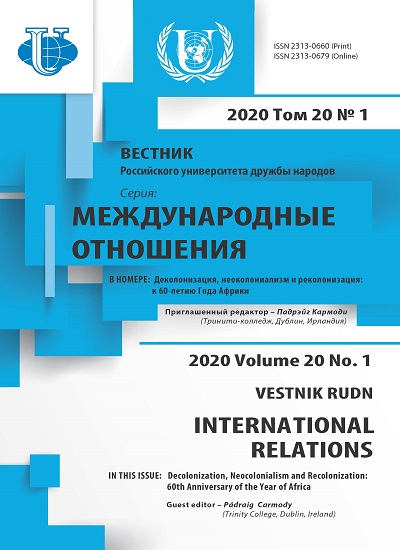Transboundary Water Conflicts as Postcolonial Legacy (the Case of Nile Basin)
- Authors: Abdullah A.M.1, Dyduck C.2, Ahmed T.Y.2
-
Affiliations:
- Al-Zaeem Al-Azhari University
- RUDN University
- Issue: Vol 20, No 1 (2020): Decolonization, Neocolonialism and Recolonization: 60th Anniversary of the Year of Africa
- Pages: 184-196
- Section: INTERNATIONAL ECONOMIC RELATIONS
- URL: https://journals.rudn.ru/international-relations/article/view/23331
- DOI: https://doi.org/10.22363/2313-0660-2020-20-1-184-196
Cite item
Full Text
Abstract
It is not shortage or lack of water that leads to conflict but the way how water is governed and managed. It is said that water will be, much more than oil, the major geopolitical issue of the 21st century. Although it is difficult to demonstrate this, it is clear that the increasing scarcity of the resource, on the one hand, and the configuration of its availability, on the other, are conflict-generating. In the particular case of the African continent, the large catchment basins of the Nile, Niger and Chad, shared by many states of unequal power, are the scene of inefficient hydro-diplomacy. Indeed, north to south, the Nile Delta is 161 km long and covers the coastline of Egypt from Alexandria in the west to Port Said in the east. Egypt with 100 mln population is de facto the principal hydro-hegemon state in the Nile basin. Nevertheless, a couple of riparian states, as Ethiopia (105 mln population), have taken measures in order to challenge this status quo: the signature and launching of the Nile Basin Initiative (NBI), the signature of Cooperative Framework Agreement (CFA), the construction of the Grand Ethiopian Renaissance Dam (GERD) and the signing of the Declaration of Principles Agreement. The article attempts to analyse the urgency of the problem of water resources allocation in Africa with particular focus to the Nile basin and the complexity of agreements regulating the issue dating back to the colonial era. The study also emphasizes the difficulties bilateral and multilateral aids faced while trying to solve a conflict. As Nile for many states is not just a source of water, it is the host of a fragile ecosystem, essential for maintaining the environmental and ecological balance of North-East Africa.
About the authors
Adam Muhammad Ahmed Abdullah
Al-Zaeem Al-Azhari University
Author for correspondence.
Email: sooni2010@gmail.com
Professor, Department of Political Science
Khartoum, SudanCelia Dyduck
RUDN University
Email: celiadyduck@yahoo.fr
Assistant, Department of Theory and History of International Relations
Moscow, Russian FederationTaha Y. Ahmed
RUDN University
Email: tahahassan88@gmail.com
postgraduate student, Department of Theory and History of International Relations
Moscow, Russian FederationReferences
- Abi Chacra, E. (2005). Les eaux du Nil: désamorcer les conflits par le partage équitable. Outre-Terre, 11 (02), 489-492. (In French). doi: 10.3917/oute.011.0489
- Abtew, W. & Dessu, S.B. (2019). The Grand Ethiopian Renaissance Dam on the Blue Nile. Berlin: Springer. doi: 10.1007/978-3-319-97094-3_8
- Amer, K., Adeel, Z., Böer, B. & Saleh, W. (Eds.). (2017). The Water, Energy, and Food Security Nexus in the Arab Region. Berlin: Springer. doi: 10.22363/2313-0660-2019-19-3-515-517
- Bencala, K.E. & Dabelko, G.D. (2008). Water Wars: Obscuring Opportunities. Journal of International Affairs, 61 (02), 21-34.
- Bouquet, C. (2011). Conflits et risques de conflits liés à l’eau en Afrique. Les Cahiers d’Outre-Mer, 255, 341-362. (In French). doi: 10.4000/com.6283
- Cascao, A.E. & Nicol, A. (2016). GERD: New Norms of Cooperation in the Nile Basin? Water International, 41 (04), 550-573. doi: 10.1080/02508060.2016.1180763
- Heggy, E. (2020). Could Mega-Dams Kill the Mighty River Nile. Al-Jazeera Report. URL: https://interactive.aljazeera.com/aje/2020/saving-the-nile/index.html (accessed: 14.02.2020)
- Larbi, B.M. (2010). L’Egypte, l’Initiative du Bassin du Nil, et les «autres». Confluences Méditerranée, 75, 191-196. (In French). doi: 10.3917/come.075.0191
- Lawson, F. (2017). Egypt versus Ethiopia: The Conflict over the Nile Metastasizes. The International Spectator, 52 (04), 129-144. doi: 10.1080/03932729.2017.1333272
- Le Floch, G. (2010). Le difficile partage des eaux du Nil. Annuaire français de droit international, 56, 471-496. (In French). doi: 10.3406/afdi.2010.4622
- Lumumba, P.L.O. (2007). The Interpretation of the 1929 Treaty and Its Legal Relevance and Implications for the Stability of the Region. African Sociological Review, 11 (01), 10-24. doi: 10.4314/asr.v11i1.51419
- Markakis, J. (1998). Resource Conflict in the Horn of Africa. Uppsala: Uppsala University
- Mason, S.A. (2004). From Conflict to Cooperation in the Nile Basin. Interaction between Water Availability, Water Management in Egypt and Sudan, and International Relations in the Eastern Nile Basin. Forschungsstelle für Sicherheitspolitik, ETH Zürich
- Mwangi, K.S. & Mbaku, J.M. (2015). Governing the Nile River Basin: The Search for a New Legal Regime. Washington: Brookings Institution Press
- Obengo, J.O. (2016). Hydropolitics of the Nile: The Case of Ethiopia and Egypt. African Security Review, 25 (01), 95-103. doi: 10.1080/10246029.2015.1126527
- Prunier, G. (2009). Le bassin du Nil: des mythes à l’hydropolitique. In: Raison, J.-P. (Eds.). Des fleuves entre conflits et compromis. Essais d’hydropolitique africaine. Paris: Editions Karthala, «Hommes et sociétés». P. 173-237. doi: 10.3917/kart.raiso.2009.01.0173
- Smirnova, G.I. & Gukasyan, G.L. (2019). Ecological Problems of the Republic of Sudan. In: Filonik, A.O. (Eds.). Arab East: Green Growth and the Challenges of the Present. Moscow: Institut vostokovedeniya RAN publ. P. 223-262. (In Russian)
- Swain, A. (2011). Challenges for Water Sharing in the Nile Basin: Changing Geo-politics and Changing Climate. Hydrological Sciences Journal, 56 (04), 687-702. doi: 10.1080/02626667.2011.577037
- Tadesse, D. (2008). The Nile: Is It a Curse or Blessing? Institut d’études de sécurité, ISS Paper 174, novembre.
- Vasiliev, A.M. & Elkina, E.A. (2018). Dividing of the Nile Water: A Way of Looking through the Prism of History. Voprosy istorii, 10, 20-28. (In Russian).
- Yagya, V.S. & Nesterova, I.E. (2018). The Nile Question Yesterday and Today. Asia and Africa Today, 5, 28-32. (In Russian). doi: 10.7868/S0321507518050057











